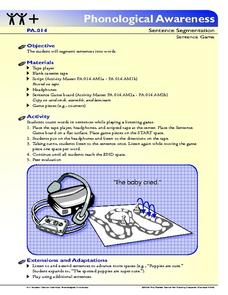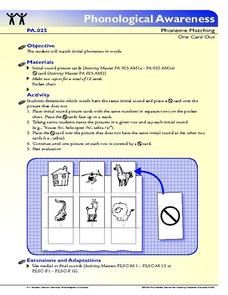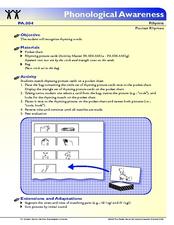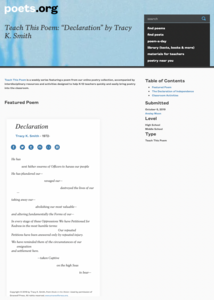National Endowment for the Humanities
“Every Day We Get More Illegal” by Juan Felipe Herrera
A study of Jan Felipe Herrera's poem "Every Day We Get More Illegal" opens the door for a discussion on immigration. To begin, class members examine the photograph "Desert Survival," record their observations of the image, and then...
Newseum
Quick Skim or Deep Dive? Picking the Right Search Strategy
To search online to find answers to some questions requires only a quick skim, while others demand deep research. Scholars engage in a lesson plan that teaches them the difference and how to craft questions that produce the best online...
Florida Center for Reading Research
Word Checkers
Young scholars practice reading high-frequency words by playing word checkers. They use the provided checker mat and checkers to read their way to the other side of the mat, making a less stressful way to provide necessary practice.
Florida Center for Reading Research
Phoneme Feud
This is a phoneme feud! A literacy game that is very similar to the classic card game War! has partners challenging each other for the most phonemes. They place one picture card face-up at a time and segment the phonemes aloud. Whoever...
Florida Center for Reading Research
Phoneme Dominoes
Unlike regular dominoes, these have pictures of simple objects. Images are matched (like pig and plant) based on their initial phonemic sound. Learners will have fun playing and saying various words, matching initial letter sounds as...
Florida Center for Reading Research
Sentence Game
How many words do you hear? As you introduce the way sentences are made up of words, this listening game offers an excellent independent practice opportunity. Kids take turns with a partner as they listen to a sentence twice, counting...
Florida Center for Reading Research
Picture Slide
Here is another fun and engaging way to help youngsters build phonological awareness. In pairs, they use the provided picture cards to sound out segments of words. As they slide the picture together they say a segment of the...
Florida Center for Reading Research
Word Blender
Little learners will love being able to blend sounds together to make words. This game provides eight onsets and eight rimes that can be used to mix and match to sound out words. This activity is to be completed in pairs and is a great...
Florida Center for Reading Research
One Card Out
Remember the song, "One of These Things is not Like The Other?" Well, this phonemic awareness activity is just like that. The only difference is that learners work to determine which initial phoneme is not like the others on the chart....
Florida Center for Reading Research
Final Phoneme Pyramid
Little learners identify final phonemes found in various words. They play a game where they pick a card, say the name of the object on the card, identify the final phoneme, then match it to an image with the same final phoneme. Whoever...
Florida Center for Reading Research
Pocket Rhymes
Rhyming is fun and it helps build phonological awareness that is key in early reading. Learners use a pocket chart and a set of 40 cards that make 20 rhyming sets to practice recognizing rhyming words. Peer one picks a card from a bag...
National Endowment for the Humanities
Harriet Jacobs and Elizabeth Keckly: The Material and Emotional Realities of Childhood in Slavery
Young historians learn how to make generalizations based on primary sources in a instructional activity that uses the autobiographies of two women born into slavery. The class watches a historical re-enactment of scenes from the lives of...
National Endowment for the Humanities
Themes in Lord of the Flies
William Golding's Lord of the Flies is the anchor text for a lesson that teaches readers how to distinguish between a literary topic and a literary theme. Using the provided worksheets, groups first chart some themes and propose a...
National Endowment for the Humanities
Characterization in Lord of the Flies
Readers of Lord of the Flies hunt down direct and indirect examples of how William Golding brings his characters to life. After instructors guide learners through the process of collecting evidence of these two types of characterization...
National Endowment for the Humanities
Symbolism in Lord of the Flies
Readers of Lord of the Flies examine the four main symbols William Golding develops in his novel: the island, the conch, the Lord of the Flies effigy, and fire. Partners select one of the major symbols and create an image by adding words...
National Endowment for the Humanities
Edgar Allan Poe, Ambrose Bierce, and the Unreliable Narrator
Stories by Edgar Allan Poe and Ambrose Bierce provide readers with an opportunity to investigate unreliable narrators. The lesson plan begins with an activity about different types of point of view and continues as scholars apply their...
Learning for Justice
Marian Wright Edelman
Marian Wright Edelman's 2014 Commencement Speech at Lewis and Clark College serves to inspire young scholars to investigate a problem in their community, to determine why the problem is important, and then to develop a plan for one thing...
Learning for Justice
Mary McLeod Bethune
Young historians conduct a close reading of the text of an interview with Mary McLeod Bethune, the daughter of former slaves who taught herself to read, grew up to establish schools for other Black women, and went on to become an advisor...
Newseum
Is It Fair?
Young journalists learn how to analyze word choice, context, and counterpoints to judge the fairness of a news story. They practice using these tools to judge a series of headlines for the story of Goldilocks and the Three Bears. They...
Learning for Justice
Mary Church Terrell
Excerpts from an 1898 speech by civil rights activist Mary Church Terrell offers young scholars an opportunity to investigate how Black American women fought for civil rights long before Rosa Parks and the civil rights movement of the...
Learning for Justice
Maya Angelou
Maya Angelou's poem, "Still I Rise", offers young scholars an opportunity to consider how poets use literary devices to create powerful messages. After a close reading and discussion of the poem, class members reflect on how they can...
Academy of American Poets
Teach This Poem: "A New National Anthem" by Ada Limón
Ada Limon's poem, "A New National Anthem," offers young scholars an opportunity to reflect on the significance of the US national anthem and the extent to which Key's vision applies to all Americans. After watching a video of Whitney...
Academy of American Poets
Teach This Poem: “Making History” by Marilyn Nelson
What makes an event newsworthy, worth a reference in a news magazine or textbook? Who decides? These are questions Marilyn Nelson asks readers of her poem "Making History" to consider. To begin, class members list details they notice in...
Academy of American Poets
Teach This Poem: “Declaration” by Tracy K. Smith
Tracy K. Smith's erasure poem "Declaration" challenges scholars to use their noticing skills to make connections between an engraving entitled "The Declaration of Independence" and Smith's poem. Class members record observations and...

























